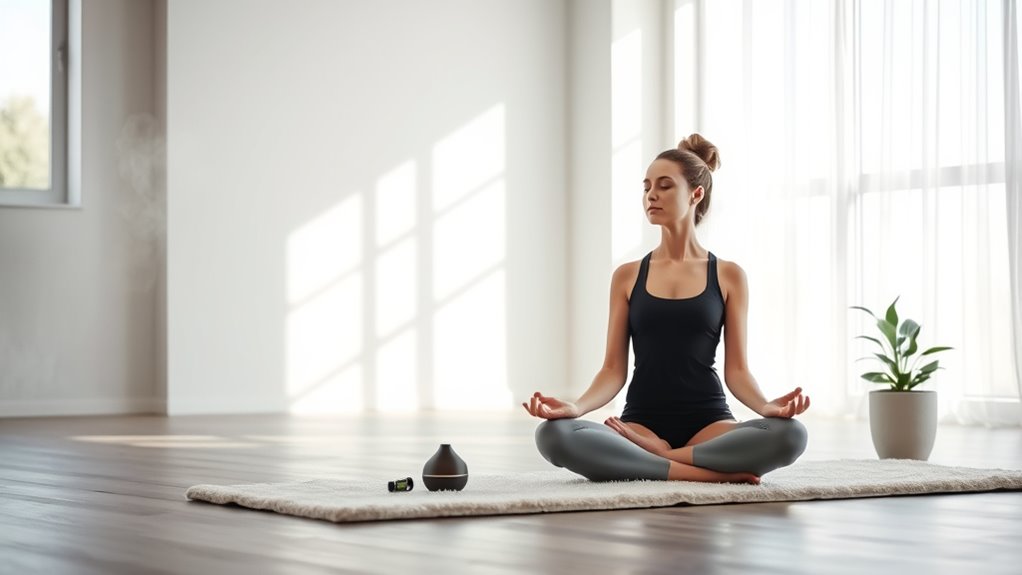You might be overlooking simple stress relief habits that pros use daily, like mindful breathing, which helps anchor you in the present and reduce tension. Prioritizing short, regular breaks boosts mental clarity and prevents burnout, while engaging in consistent physical activity releases mood-enhancing endorphins. Practicing gratitude shifts your focus to positive aspects, fostering resilience. Keep exploring these easy techniques to discover more effective ways to manage stress naturally and effortlessly.
Key Takeaways
- Incorporate mindful breathing into daily routines to quickly lower stress and improve focus.
- Take short, regular breaks to prevent burnout and maintain mental clarity throughout the day.
- Engage in consistent physical activity to boost mood and reduce stress hormones naturally.
- Practice gratitude and positive reflection to shift focus away from worries and foster emotional resilience.
- Utilize stress management techniques like sound healing and mindful awareness for comprehensive relaxation.
Incorporating Mindful Breathing Into Daily Routines

Integrating mindful breathing into your daily routines can considerably reduce stress and improve overall well-being. By practicing simple mindful breathing techniques, you can anchor yourself in the present moment and calm your mind. Start with a few minutes each morning or during breaks, focusing on slow, deep breaths. Incorporate daily meditation practices that emphasize breath awareness, helping you build a habit of mindful presence. These techniques don’t require special equipment or much time, making them easy to fit into any schedule. As you become more consistent, you’ll notice reduced anxiety and enhanced clarity throughout your day. Regularly engaging in mindful breathing helps you manage stress more effectively, creating a foundation for a calmer, more centered life. Additionally, understanding the power of controlled breathing can further enhance your stress reduction efforts.
Prioritizing Short, Regular Breaks Throughout the Day

Taking short, regular breaks during the day can markedly boost your productivity and reduce stress. Schedule brief coffee breaks to refresh your mind and give yourself a moment to breathe. During these breaks, stand up and do desk stretches to loosen tight muscles and improve circulation. These quick pauses prevent burnout and help maintain focus throughout the day. Avoid working nonstop; instead, set timers to remind you to step away from your workspace periodically. Even a few minutes away can clear your head and decrease stress levels. Incorporate simple habits like grabbing a coffee or stretching at regular intervals to keep your energy steady and your mind clear. Prioritizing these short breaks ensures that you stay balanced and resilient during busy workdays. Additionally, understanding the importance of user privacy and managing your cookie preferences can contribute to a more comfortable online experience.
Engaging in Consistent Physical Activity

Engaging in consistent physical activity is one of the most effective ways to lower stress levels and boost your overall well-being. Regular exercise helps you manage stress by releasing endorphins, which act as natural mood lifters. Incorporate stress management techniques like brisk walks, cycling, or yoga into your routine to keep stress at bay. Physical activity also enhances relaxation exercises, helping your body recover from daily tension. You don’t need intense workouts; even moderate activities can make a significant difference. Scheduling consistent sessions ensures you stay committed, making stress reduction a natural part of your life. By staying active regularly, you build resilience against stress triggers and improve your mental clarity, giving you better control over your emotional responses. Additionally, integrating sound healing science techniques such as calming sound frequencies may further enhance your relaxation and stress relief efforts.
Practicing Gratitude and Positive Reflection

Practicing gratitude and positive reflection can considerably reduce stress by shifting your focus from worries to appreciation. Incorporate simple habits like gratitude journaling or positive affirmation exercises into your routine. These practices help reframe negative thoughts and foster a sense of calm. Here are three effective ways to get started:
- Keep a gratitude journal, noting three things you’re thankful for each day.
- Use positive affirmation exercises to boost your confidence and mood.
- Reflect on your accomplishments, no matter how small, to reinforce a positive mindset.
- Recognize soulmate angel numbers as signs of alignment and readiness for love, which can enhance your emotional well-being.
Frequently Asked Questions
How Quickly Can Stress Reduction Habits Improve Mental Health?
You can notice mental health improvements within days of adopting stress reduction habits. Techniques like deep breathing, meditation, or exercise often deliver quick results, helping you feel calmer and more focused fast. While lasting change takes time, consistent practice can boost your mental well-being quickly, making it easier to manage daily stress. So, start today—small steps can lead to meaningful mental health improvements sooner than you think.
Are There Any Risks Associated With Certain Stress Reduction Techniques?
Yes, there are risks involved with some stress reduction techniques. For example, meditation or deep breathing might cause dizziness or anxiety if done improperly or if you have underlying health issues. Always consider safety considerations and consult a healthcare professional if you have concerns. Avoid techniques that trigger negative reactions, and start slowly to ensure your chosen method is safe and effective for your specific needs.
Can These Habits Be Effective for Severe Anxiety or Depression?
Like a lighthouse guiding ships through stormy seas, mindfulness meditation and breathing exercises can offer relief for severe anxiety or depression. While they might not replace professional treatment, they can substantially complement therapy. Regular practice helps calm your mind and body, reducing symptoms over time. Remember, these habits are powerful tools, but for deep-seated issues, always seek guidance from mental health professionals to ensure thorough care.
How Do I Stay Motivated to Maintain These Habits Long-Term?
To stay motivated long-term, focus on habit consistency by setting small, achievable goals that build momentum. Use motivational strategies like rewarding yourself for progress and tracking your habits to see your growth. Remind yourself of the benefits stress reduction brings to your life, which can boost your commitment. Keep a routine, stay flexible when needed, and celebrate milestones to maintain your motivation and make these habits a lasting part of your daily routine.
Do Stress Reduction Practices Work Equally for Everyone?
Think of stress reduction practices like keys to different doors—they don’t open the same door for everyone. You need personalized approaches because cultural differences shape how you experience and manage stress. Some techniques work wonders for others, but you might need to tweak them to fit your background and preferences. Experiment, stay open-minded, and remember that finding your unique method is the best way to uncover true stress relief.
Conclusion
Don’t underestimate the power of simple habits like mindful breathing or quick breaks—they might seem small, but they pack a punch against stress. While you’re busy tackling your to-do list, these habits create a calm, focused pause amid chaos. It’s easy to overlook these tools, but when you incorporate them daily, you’ll notice a difference. Sometimes, the tiniest change can be the biggest relief—so why not try?









